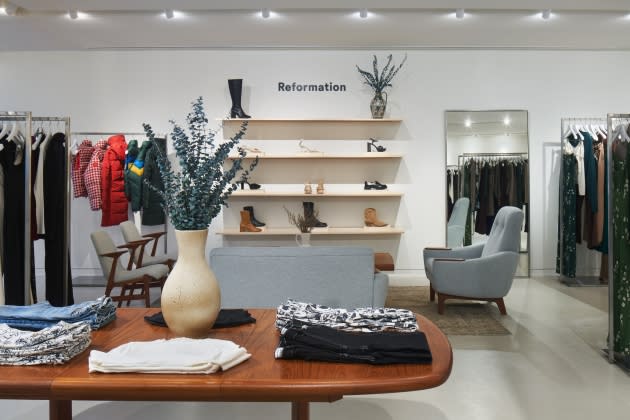Reformation Opens Its First Canadian Store Outfitted With High-Tech Shopping

Reformation, the Los Angeles clothing brand founded in 2009 to be all things sustainable, has been on a major retail rollout in the last few years.
On December 14, it opened its ninth store this year. It is located in the Toronto suburb of Yorkville, Canada, not far from its first store in Canada at the Yorkdale Shopping Centre, and is the brand’s second largest flagship after Covent Garden in London.
More from WWD
The newest location at 87 Yorkville Avenue, at 3,556 square feet, will be Reformation’s first Canadian venue to incorporate the company’s in-house system of high-tech shopping developed in 2017 and launched at its San Francisco location.
High-tech shopping is now in 30 of the company’s 36 stores. “The goal is that the majority of our stores will have this tech experience because it really just brings together the online and in-store experience and makes it more seamless for the customer,” said Hali Borenstein, Reformation’s chief executive since 2020, when company founder Yael Aflalo left the organization.
In support of its sustainability mission, the new store, like all Reformation outposts, features natural and recyclable materials, including vintage furniture, eco-friendly fabrics and hangers and reusable totes. All the store’s electricity is offset with renewable energy, the company said.
Throughout the new Canadian store, there are touchscreen monitors so customers can digitally select the items they would like to try on. The selections end up in one of the store’s eight “magic wardrobe” dressing rooms with two-way doors to a closet that allows staff to place additional items that customers ordered via a dressing-room touchscreen.
To enhance the experience, each dressing room has three lighting selections: cool, golden or “sexy time.”
Reformation believes in-store retail technology makes shopping easier for customers and frees up sales staff. “We found our team was so busy putting away garments or trying to be very transactional, that it was hard for them to really build a deep relationship with the customer,” Borenstein explained.
Reformation has been on a major retail push ever since Permira, a private equity fund, acquired a majority interest in the company in 2019.
At the time, Reformation had 14 stores in the United States and no permanent international doors. Now it has 36 stores, five of which are in England and Canada, with nine new locations expected to open next year, Borenstein said.
One of the next shops to open will be a flagship outpost at South Coast Plaza, in Costa Mesa, California, which houses prestigious brands including Saks Fifth Avenue, Bloomingdale’s, Max Mara, Tiffany, Burberry, Balenciaga, Chanel and Dolce & Gabbana. The Reformation location is expected to debut in January and take up about 4,000 square feet.
Even though 70 to 75 percent of the company’s revenues come from e-commerce sales, Reformation is a strong believer that retail is not dead.
The company looks at where its e-commerce sales are strong and then goes from there to figure out store locations. “We are very customer-focused. So, when you think about how customers shop, they are not thinking about whether it’s online or in store,” Borenstein said. “They are going to do what’s convenient or what makes sense for them. So, if you want to be convenient and at the top of customers’ minds, I think we need to be in both places.”
And when a Reformation store opens, e-commerce sales in that region see an uptick too.
Reformation started out humbly as a side project for Yael Aflalo, who at the time was running Ya-Ya, her first clothing label. Her side project was to sell vintage clothing and garments made of deadstock fabric out of the back room of a Los Angeles retail store in her mission to cut down on textile waste.
Since then, the company has mushroomed into a global brand that continues to carry on with that mission and be kinder to the climate.
Each new piece of merchandise developed by Reformation incorporates sustainability and is 100 percent carbon neutral. The company said it is committed to being climate positive by 2025.
About 50 percent of the company’s merchandise is manufactured overseas in Europe and Asia. The rest is made in the United States, including Los Angeles, where it has its own sustainable factory employing 200 workers.
In recent years, Reformation has been adding new sustainable merchandise categories. The two most recent additions are activewear and shoes.
Shoes were particularly difficult to fashion with sustainability in mind.
“For a dress, if you get the fabric right, you’re doing 70 to 80 percent of the work. In shoes, you have 25 to 30 components and each one has its own supply chain,” Borenstein said. “And that’s really hard.”
For shoes, Reformation turned to Brazil, which makes sustainable leather. “All the way from the ranch and up, from the chemicals used to the water runoff, it is very different from your typical leather processing supply chain,” the Reformation CEO said.
Recently, Reformation partnered with Canada Goose for a collection of sustainable outerwear and accessories. Intended to be passed down for generations, the outerwear pieces feature an exclusive interior lining with a “Loved By” label, which includes blank lines that can be filled in with the names of friends and family as the garments are shared and reused over the years. It is available to shop in the Yorkville store.

